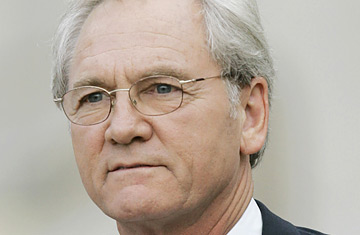
Former Alabama Governor Don Siegelman
(3 of 3)
This evidence was heard by lawyers from U.S. Attorney Canary's office, representatives of Alabama's Republican attorney general and an attorney from the Justice Department's public-integrity unit in Washington. But in an unusual exercise of prosecutorial discretion, nearly all the payments and donations went uninvestigated. And when Siegelman's defense team, which had obtained Young's statements amid tens of thousands of documents provided in discovery, raised his accusations briefly in court, a judge quickly ruled them irrelevant.
Legal experts say prosecutors enjoy wide latitude in deciding whom to charge in criminal cases. But according to Laurie Levenson, a former assistant U.S. Attorney and a prominent expert in legal ethics at Loyola Law School in Los Angeles, there are limits. "Certainly prosecutors would face a professional obligation to check out or verify the allegations in this case," she says. "Not doing so would represent a potential abuse of prosecutorial discretion." The key, she adds, is whether prosecutors chose not to pursue evidence of criminal activity by Republicans because of political bias or a conflict of interest. Sometimes prosecutors have a more benign motive; they may simply verify that allegations are untrue or be unclear on how to categorize the offense or the relevant statute of limitations. Certainly in Young's statements about Sessions and Pryor, he did not allege a quid pro quo for his money laundering of their campaigns. And whatever the involvement of their campaigns, Sessions and Pryor both assert they were completely unaware of his confessed chicanery. But the U.S. Attorney's office chose to prosecute Siegelman in no small measure on the basis of Young's word and chose not to investigate Sessions and Pryor — or their campaigns — on the basis of that same word.
Several people involved in the Siegelman case who spoke to TIME say prosecutors were so focused on going after Siegelman that they showed almost no interest in tracking down what Young said about apparently illegal contributions to Sessions, Pryor, other well-known figures in the Alabama G.O.P. and even a few of the state's Democrats. "It just didn't seem like that was ever going to happen," said an individual present during key parts of the investigation. "Sessions and Pryor were on the home team."
That description is not just a metaphor: several of the lawyers involved in the Siegelman investigation were from Pryor's office and had worked for Sessions as well when he held the post. In such circumstances, say experts on legal ethics, it is nearly always incumbent on investigators to inform a third party and recuse themselves from further questioning to avoid a conflict of interest. In this instance, it appears the investigators chose not to recuse themselves but to simply ignore the allegations. (Steve Feaga, an assistant U.S. Attorney in Canary's office, says, "I'm confident that we investigated every viable federal crime and prosecuted them.")
The fact that most of Young's claimed contributions apparently went unrecorded raises the possibility that he never made them, that he was merely boasting. But it would also mean that he had lied to federal agents, which is a felony, and Young was never charged with that crime. If he had lied, that would also have diminished Young's credibility as a key government witness against Siegelman. One of Young's lawyers tells TIME, "There was never the slightest suggestion by prosecutors that the information my client provided about contributions to Sessions and Pryor was in any way untrue." The judge in the Siegelman case also seemed to find Young credible: he stated at sentencing that he had increased the sentencing guidelines for the Governor on the basis of a prosecution memo that alleged "systematic and pervasive corruption" and cited a "criminal relationship with Lanny Young."
The controversy surrounding the case in Alabama is not that Siegelman went to prison and his Republican colleagues didn't. Without an investigation or even questions being asked, it's impossible to know whether any of them committed illegal acts. The issue is that some of the same allegations that led to Siegelman's indictment never merited so much as a follow-up when raised in connection with Republicans.
U.S. Attorney Canary has vigorously rejected the suggestion of any political influence on the case. She has pointed out that the investigation of Siegelman originated not with her but with her Democratic predecessor as U.S. Attorney and in the office of Alabama's then attorney general, Bill Pryor. Moreover, she notes that she was in charge of the case for only eight months, long before indictments were handed down, and then publicly recused herself to avoid even the appearance of a conflict of interest.
Yet Canary was in charge when Young spoke about his payments to the Sessions and Pryor campaigns and to other Alabama Republicans. At the same time, her husband's consulting firm, Capitol Group LLC, was being paid close to $40,000 to advise Pryor. A source who held a senior post in Canary's office during the long-running investigation into Siegelman says it's almost inconceivable that Canary would not have been informed of Young's charges against prominent Republican officeholders and candidates. Canary denied that to TIME. The fact that those charges were never looked at will only heighten suspicions that the Siegelman prosecution was a case of selective justice and that in the Bush Administration, enforcing the law has been a partisan pursuit.
